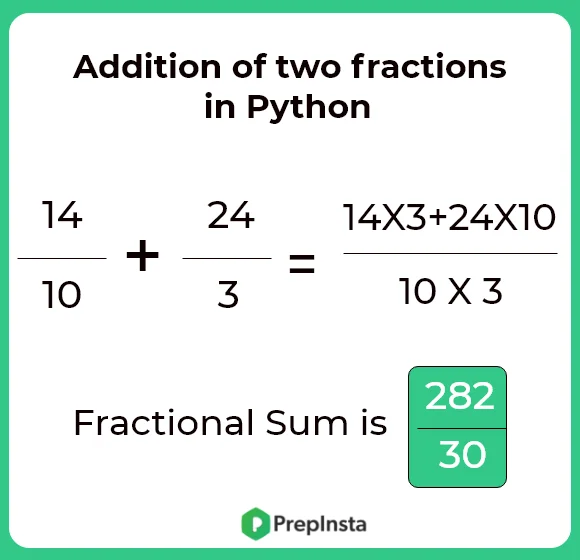Python Program for Addition of two fractions
Addition of two fractions
Here, in this page we will discuss program for addition of two fractions in python. For this purpose we need to ask the user to enter two fractional values where each fraction must consist a Numerator and a Denominator.

Concept
For understanding this in a better way lets suppose an example :
Suppose, First fraction consist of 1 as numerator and 3 as denominator, and Second fraction consist of 3 as numerator and 9 as denominator.
(1 / 3) + (3 / 9) = (6 / 9) = (2 / 3)
- Find LCM of 3 and 9 and the result will be 9.
- Multiply 3 in first fraction : (3 / 9) + (3 / 9)
- Add both fractions and then the result will be : (6 / 9)
- Now simplify it by finding the HCF of 6 and 9 and the result will be 3.
- So divide 6 and 9 by 3 and then the result will be : (2 / 3)
- This will be your simplified answer for the given problem.
Algorithm
- Initialize variables of numerator and denominator
- Take user input of two fraction
- Find numerator using this condition (n1*d2) +(d1*n2 ) where n1,n2 are numerator and d1 and d2 are denominator
- Find denominator using this condition (d1*d2) for lcm
- Calculate GCD of a this new numerator and denominator
- Display a two value of this condition x / gcd, y/gcd

Python code
Run
def findGCD(n1, n2):
gcd = 0
for i in range(1, int(min(n1, n2)) + 1):
if n1 % i == 0 and n2 % i == 0:
gcd = i
return gcd
# input first fraction
num1, den1 = map(int, list(input("Enter numerator and denominator of first number : ").split(" ")))
# input first fraction
num2, den2 = map(int, list(input("Enter numerator and denominator of second number: ").split(" ")))
lcm = (den1 * den2) // findGCD(den1, den2)
sum = (num1 * lcm // den1) + (num2 * lcm // den2)
num3 = sum // findGCD(sum, lcm)
lcm = lcm // findGCD(sum, lcm)
print(num1, "/", den1, " + ", num2, "/", den2, " = ", num3, "/", lcm)
Output
Enter numerator and denominator of first number : 14 10 Enter numerator and denominator of second number: 24 3 14 / 10 + 24 / 3 = 47 / 5
For similar Questions click on the given button.
Prime Course Trailer
Related Banners
Get PrepInsta Prime & get Access to all 200+ courses offered by PrepInsta in One Subscription






n1,n2,d1,d2 = map(int,list(input().split()))
nume = n1*d2 + n2*d1
den = d1*d2
gcd = 1
for i in range(1,(min(nume,den))):
if nume%i == 0 and den%i==0:
gcd = i
nume = nume//gcd
den = den//gcd
print(n1,”/”,d1,”+”,n2,”/”,d2,”=”,nume,”/”,den)
Output:
14 24 10 3
14 / 10 + 24 / 3 = 47 / 5
n1=int(input(“num1”))
n2=int(input(“num2”))
d1=int(input(“dnum1”))
d2=int(input(“dnum2″))
s=n1*d2+n2*d1
u=d1*d2
print(s,”/”,u)
from fractions import *
def fraction_sum(a,b):
print(Fraction(Fraction(a)+Fraction(b)))
fraction_sum(‘1/3′,’3/9’)
def add_fraction(f1,f2):
num1,den1 = f1
num2,den2 = f2
common_den = den1 * den2
new_num1 = num1 * den2
new_num2 = num2 * den1
sum_num = new_num1 + new_num2
return (sum_num,common_den)
f1 = (1,3)
f2 = (1,4)
result = add_fraction(f1,f2)
print(result)
n1,d1=map(int,list(input(“enter numerator and denominator of 1st fraction:”).split(” “)))
n2,d2=map(int,list(input(“enter numerator and denominator of 1st fraction:”).split(” “)))
lcm=d1*d2
num=(n1*d2)+(n2*d1)
fraction=num/lcm
print(“raw fraction”,num,’/’,lcm)
def gcd(numerator,lcm):
g=0
for i in range(1,min(n1,n2)+1):
if n1%i==0 and n2%i==0:
g=i
return g
numerator=num/gcd(num,lcm)
denominator=lcm/gcd(num,lcm)
reqfraction=numerator/denominator
print(‘required fraction is sum of ‘,n1,’/’,d1,’+’,n2,’/’,d2,’=’,numerator,’/’,denominator)
n1=int(input(‘Enter First Numerator :’))
d1=int(input(‘Enter First Denominator:’))
n2=int(input(‘Enter Second Numerator:’))
d2=int(input(‘Enter Second Denominator:’))
x=(n1*d2)+(n2*d1)
x1=x
y=d1*d2
y1=y
while x!=y:
if x>y:
x=x-y
else:
y=y-x
hcf=x
print(‘Addition of Two Fractions:’,n1,’/’,d1,’+’,n2,’/’,d2,’=’,x1//hcf,’/’,y1//hcf)
# EASY WAY:
n1 = int(input(“Enter 1st Numerator:”))
d1 = int(input(“Enter 1st denominator:”))
n2 = int(input(“Enter 2nd Numerator:”))
d2 = int(input(“Enter 2nd denominator:”))
num1 = (n1*d2)
num2 = (d1*n2)
den = (d1*d2)
res = num1 + num2
print(res, “/”, den)
# EASY WAY:
n1 = int(input(“Enter 1st Numerator:”))
d1 = int(input(“Enter 1st denominator:”))
n2 = int(input(“Enter 2nd Numerator:”))
d2 = int(input(“Enter 2nd denominator:”))
num1 = (n1*d2)
num2 = (d1*n2)
den = (d1*d2)
res = num1 + num2
print(res, “/”, den)
g1nume = int(input(‘Enter the numerator for 1st fraction :’))
g1deno = int(input(‘Enter the denominator for the 1st fraction :’))
g2nume = int(input(‘Enter the numerator for 2nd fraction :’))
g2deno = int(input(‘Enter the denominator for the 2nd fraction :’))
n = g1deno*g2deno
o = g2deno*g1nume
h = g1deno*g2nume
k = o + h
print(k, ‘/’, n)
Print(k, ‘/’, n) — unknowingly typed in same line
#Easy to understand
g1nume = int(input(‘Enter the numerator for 1st fraction :’))
g1deno = int(input(‘Enter the denominator for the 1st fraction :’))
g2nume = int(input(‘Enter the numerator for 2nd fraction :’))
g2deno = int(input(‘Enter the denominator for the 2nd fraction :’))
n = g1deno*g2deno
o = g2deno*g1nume
h = g1deno*g2nume
k = o + h
print(k, ‘/’, n)
For same denominator , The above code is not fully combined:;
f1_nume = int(input(‘Enter the numerator for 1st fraction :’))
f1_deno = int(input(‘Enter the denominator for the 1st fraction :’))
f2_nume = int(input(‘Enter the numerator for 2nd fraction :’))
f2_deno = int(input(‘Enter the denominator for the 2nd fraction :’))
#check if denominators are same
if(f1_deno == f2_deno):
#add numerator
Fraction1 = f1_nume + f2_nume
#print
print(‘Addition of two fractions are :’,Fraction1 ,”/”,(f1_deno))
#if denominators are not same
else:
#to find the sum
#denominators should be same
#apply cross Multiplication
Fraction2 = (f1_nume * f2_deno) + (f2_nume * f1_deno)
print(‘Addition of fractions are :’,(Fraction2),”/”, (f1_deno * f2_deno))
Can it Be done like this cause this is more easy:
nume1 = int(input(“Enter Number : “))
deno1 = int(input(“Enter Number : “))
nume2 = int(input(“Enter Number : “))
deno2 = int(input(“Enter Number : “))
x = (nume1*deno2) + (nume2*deno1)
y = deno1 * deno2
print(“{}/{}”.format(x, y))